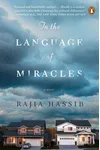Picture an Egyptian storyteller weaving tales of family, identity, and resilience—meet Rajia Hassib! Born in Egypt and now a celebrated voice in Arab-American literature, Hassib crafts novels that explore the immigrant experience with heart and nuance. Her debut, In the Language of Miracles, captivated readers, earning a New York Times Editors’ Choice nod and cementing her as a must-read author.
Hassib’s stories aren’t just books—they’re windows into the complexities of cultural identity and human connection. With a knack for blending emotional depth with sharp social commentary, she’s become a vital voice for readers craving authentic, thought-provoking narratives.
The Making of Rajia Hassib
Born and raised in Egypt, Rajia Hassib grew up immersed in a rich tapestry of culture and tradition. At 23, she moved to the United States, a transition that shaped her perspective and fueled her storytelling. Initially trained as an architect, Hassib later pursued her passion for writing, earning an MA in Creative Writing from Marshall University. Her Egyptian roots and American life blend seamlessly in her work, offering a unique lens on the immigrant experience.
Hassib’s journey to authorship wasn’t a straight path. Inspired by the post-9/11 challenges faced by Muslim Americans, she began exploring themes of guilt, belonging, and cultural dissonance. Her short fiction appeared in magazines like Upstreet and Border Crossing, laying the groundwork for her powerful novels.
Rajia Hassib’s Unforgettable Stories
Hassib’s debut novel, In the Language of Miracles (2015), is a poignant tale of an Egyptian-American family grappling with tragedy after their eldest son commits a devastating act. Set in a small New Jersey town, the story unfolds over five days, exploring grief, cultural identity, and societal judgment. Praised for its lyrical prose and emotional depth, it earned an honorable mention from the Arab American Book Awards.
Her second novel, A Pure Heart (2019), dives into the lives of two Egyptian sisters—one in Cairo, one in New York—whose paths diverge after a suicide bombing. Hassib’s crystalline prose tackles themes of faith, loss, and reconciliation, earning accolades from outlets like Vanity Fair and Real Simple. Both novels showcase her signature style: intimate character studies woven with cultural commentary and universal truths.
Hassib’s writing stands out for its unflinching honesty and graceful storytelling. She deftly balances Egyptian traditions—like the grandmother’s prayers and incense in In the Language of Miracles—with modern American life, creating narratives that resonate across cultures. Her use of metaphors, like the monarch butterfly’s migration, adds poetic depth to her exploration of home and belonging.
Why Rajia Hassib Matters
Rajia Hassib’s work is a beacon for Arab-American literature, challenging stereotypes and humanizing the immigrant experience. Her novels offer a nuanced look at Muslim life in post-9/11 America, fostering empathy and understanding. By centering complex, relatable characters, she bridges cultural divides, reminding readers of our shared humanity.
Hassib’s impact extends beyond her books. As an Egyptian-American author, she’s part of a growing wave of voices redefining contemporary fiction. Her contributions to The New York Times Book Review and The New Yorker online further amplify her influence, making her a key figure in literary discussions about identity and belonging.
- Born: Egypt
- Key Works: In the Language of Miracles (2015), A Pure Heart (2019)
- Awards: New York Times Editors’ Choice, Honorable Mention from Arab American Book Awards
- Resides: West Virginia, USA
Snag In the Language of Miracles or A Pure Heart and dive into Rajia Hassib’s soul-stirring world of family, culture, and resilience!

